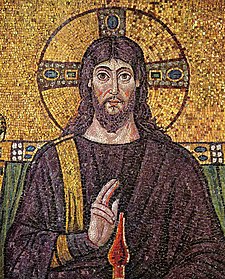Jesus
From Wikipedia, the free encyclopedia
| Jesus of Nazareth | |
 6th-century mosaic of Jesus at Basilica of Sant'Apollinare Nuovo in Ravenna. Though depictions of Jesus are culturally important, no undisputed record of Jesus' appearance is known to exist. | |
| Born | 7–2 BC/BCE Bethlehem, Judea, Roman Empire (traditional); Nazareth, Galilee (according to some historians) |
|---|---|
| Died | 26–36 AD/CE Calvary, Judea, Roman Empire (According to the New Testament, he rose on the third day after his death.) |
| Cause of death | Crucifixion |
| Resting place | Traditionally and temporarily, a garden tomb located in what is now the Church of the Holy Sepulchre.[1] |
| Ethnicity | Jewish |
| Occupation | itinerant preacher, healer |
| Home town | Nazareth, Roman Empire (modern-day Israel) |
Jesus of Nazareth (7–2 BC/BCE – 26–36 AD/CE),[2][3] also known as Jesus Christ, is the central figure of Christianity and is worshipped by most Christian churches as the Son of God and as God incarnate. Christians also view him as the Messiah foretold in the Old Testament; Judaism rejects this claim. Islam considers Jesus a prophet, while several other religions revere him in some way.
The principal sources of information regarding Jesus' life and teachings are the four canonical gospels, especially the Synoptic Gospels,[4] though some scholars argue that other texts (such as the Gospel of Thomas) are as relevant as the canonical gospels to the historical Jesus.[5] Most critical scholars in the fields of history and biblical studies believe that some parts of the ancient texts on Jesus are useful for reconstructing his life,[6][7][8][9] agreeing that Jesus was a Jew who was regarded as a teacher and healer. They also generally accept that he was baptized by John the Baptist, and was crucified in Jerusalem on the orders of the Roman Prefect of Judaea, Pontius Pilate, on the charge of sedition against the Roman Empire.[10][11] Aside from these few conclusions, academic studies remain inconclusive about the chronology, the central message of Jesus' preaching, his social class, cultural environment, and religious orientation.[12] Scholars offer competing descriptions of Jesus as the awaited Messiah,[13] as a self-described Messiah, as the leader of an apocalyptic movement, as an itinerant sage, as a charismatic healer, and as the founder of an independent religious movement.
Christian views of Jesus (see also Christology) center on the belief that Jesus is divine, is the Messiah whose coming was prophesied in the Old Testament, and that he was resurrected after his crucifixion. Christians predominantly believe that Jesus is the "Son of God" (generally meaning that he is God the Son, the second person in the Trinity), who came to provide salvation and reconciliation with God by his death for their sins. Other Christian beliefs include Jesus' virgin birth, performance of miracles, ascension into Heaven, and a future Second Coming. While the doctrine of the Trinity is widely accepted by Christians, a small minority instead hold various nontrinitarian beliefs concerning the divinity of Jesus.[14]
In Islam, Jesus (Arabic: عيسى, commonly transliterated as Isa) is considered one of God's important prophets,[15][16] a bringer of scripture, and a worker of miracles. Jesus is also called "Messiah", but Islam does not teach that he was divine. Islam teaches that Jesus ascended bodily to heaven,[17] rather than the traditional Christian belief of the death and resurrection of Jesus.








Posting Komentar